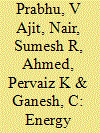| Srl | Item |
| 1 |
ID:
123281


|
|
|
|
|
| Publication |
2013.
|
| Summary/Abstract |
The energy conservation behaviour of people is a significant issue given the growing global concern about environmental issues. The current study is part of a larger intervention project aimed at changing the energy use behaviour of people living in rural households in Kerala, India. Preliminary activities of the project started in early 1997. The management and administration of the project spread over a period of 8 years. The study explores the extent of energy saved by these rural households when awareness, availability and training about the technologies are present, and thereby examines the impact of attitudinal variables and contextual factors on the energy-saving behaviour of people. This paper revisits the theories of behavioural change in the context of energy-saving behaviour and investigates whether Attitude, Behaviour, Context theory can be used to predict environmentally significant human behaviour. Findings revealed that traditional habits and beliefs influenced attitude formation in rural households and hence should be treated as an important consideration in changing energy conservation behaviours in the future.
|
|
|
|
|
|
|
|
|
|
|
|
|
|
|
|
| 2 |
ID:
169868


|
|
|
|
|
| Summary/Abstract |
We investigate how different types of energy feedback, combined with goal setting, impact on consumers' motivation to conserve electricity. Using an online survey, we test the influence of energy feedback in physical units (kWh), monetary values (EUR) and environmental values (avoided CO2 emissions). We asked participants to set themselves either a high, low or no energy conservation goal. In addition, we assess the respondents’ value types - hedonic, egoistic, altruistic and biospheric – to test predictions derived from goal framing theory. In general, individuals scoring high on biospheric values were more motivated to conserve electricity and their motivation did not increase in response to setting an energy conservation goal. Individuals with egoistic values seem less willing to reduce their electricity consumption, unless in the monetary feedback or high goal conditions. A high conservation goal was only found to be effective in combination with monetary feedback: it increased the motivation to save electricity by 6.7 percentage points in comparison to the low goal condition and 6.6 percentage points in comparison to the control condition.
|
|
|
|
|
|
|
|
|
|
|
|
|
|
|
|